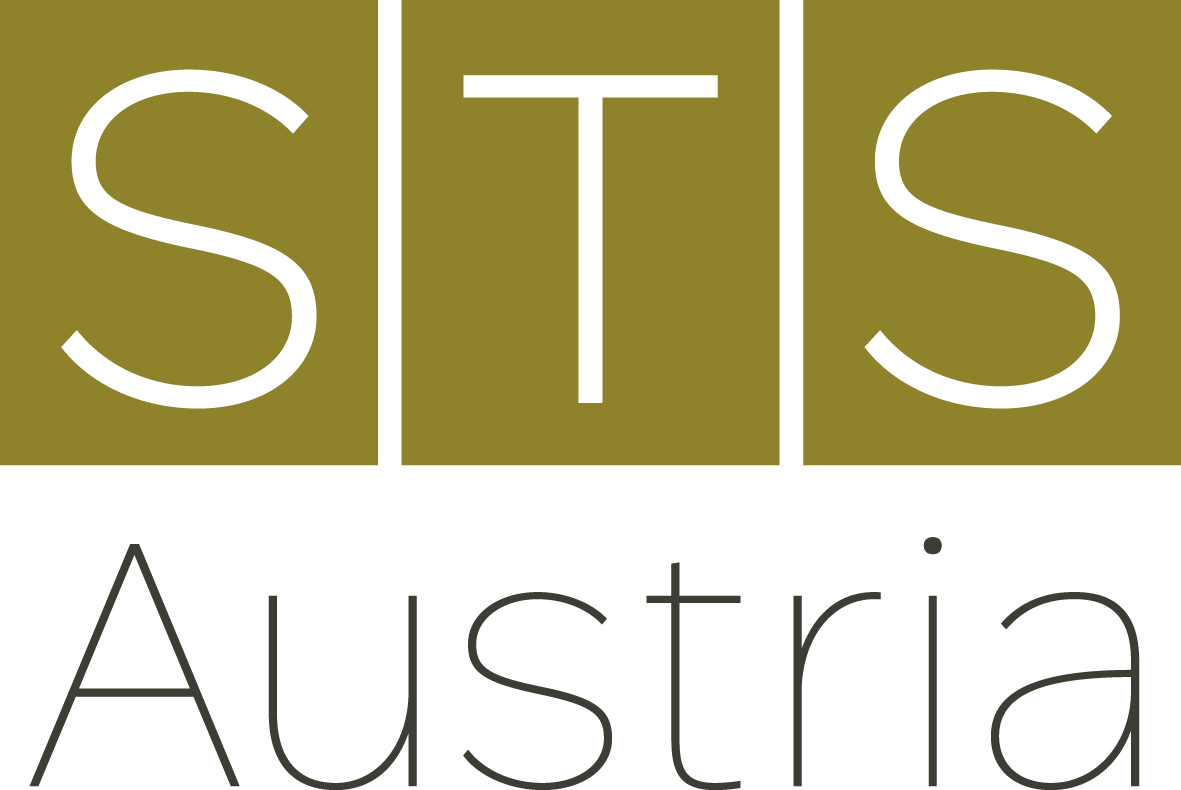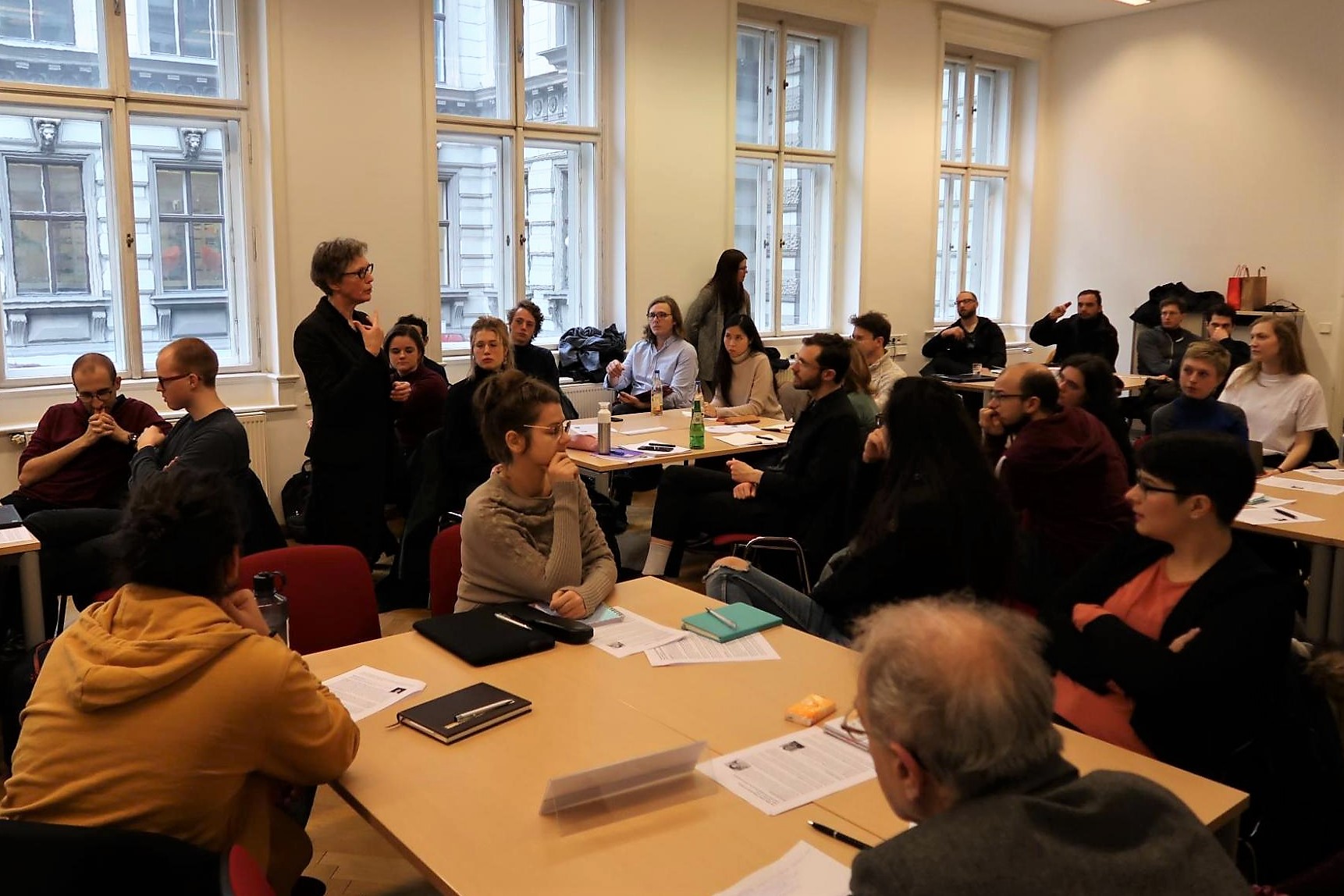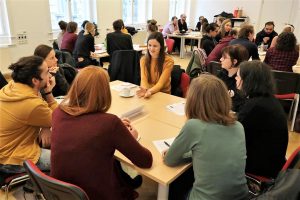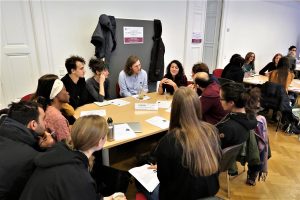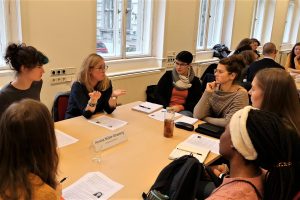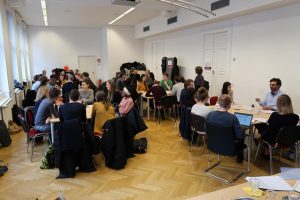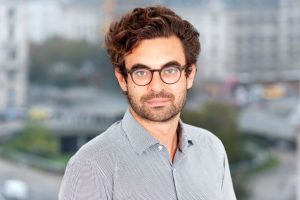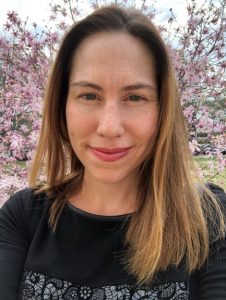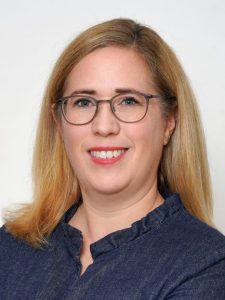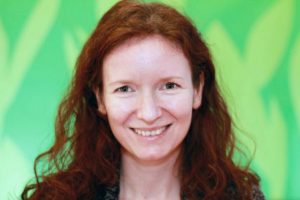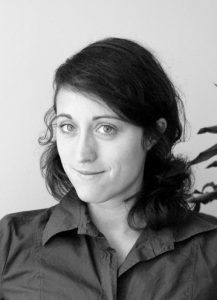Friday, December 6, 2019
Institute for Advanced Studies, Vienna
In December 2019, STS Austria organized a workshop titled “STS: Skills, (Career) Trajectories and Stories”, in cooperation with the University of Vienna and the University of Klagenfurt. The workshop created a space to collectively reflect on potential occupational fields for STS graduates, and learn about possible careers from first-hand experiences. Jessica Mesman (Maastricht University), the long-standing coordinator of the European Inter-University Association on Society, Science and Technology (ESST) and its international master’s program, kicked off discussions with a keynote speech on the career perspectives and potential contributions of STS graduates. In her talk, she focused on the skills STS students acquire, sometimes without being aware of them, the critical and engaged perspectives on the world that an STS education opens up, and how we can think about applying them in fields beyond academic careers. For example, STS students are trained to bring in complementary perspectives, resist the urge to find quick answers to complex problems and instead foster “slow science”, and to build bridges between different academic and professional communities.
To further reflections about potential career trajectories, we invited 6 STS alumni to take on the role of ‘Living Books’ and tell the workshop participants about their very own pathways. Bernhard Böhm, Laurel Kennedy, Marlene Lang, Annina Müller-Strassnig, Simone Schumann and Isabella Wagner offered to tell us their stories and discuss their experience of navigating the job market with an STS degree.
In case you missed the event, we have made the short self-descriptions of our ‘Living Books’ available below. Moreover, you can find further reflections on the event in Florentine’s blogpost here.
“Living Books“ Roundtable Discussions with STS Graduates
Bernhard Böhm
Bernhard Böhm is a PhD student at ETH Zurich, where he is affiliated with the department of architecture as well as with the chair of science studies. Currently, he is a junior fellow at the International Research Centre for Cultural Studies (IFK) at the University of Art and Design Linz in Vienna. Apart from his academic work, he supports architects in the development of urban design projects.
Which area are you currently working in, and why is this interesting and rewarding? In my PhD, I ethnographically examine and compare the politics and practices of ‘Design Research’ at four different architecture schools in the USA and UK. Furthermore, I teach STS to architecture students and consult architects regarding social aspects of urban design projects. I very much enjoy being both, an analyst of research cultures in architecture as well as an STS scholar participating in architectural design projects.
Which STS topics and knowledge are relevant for your work? I combine three different areas of STS research: approaches analysing science as culture, such as laboratory studies; recent STS studies on design and architecture; co-productionist concepts relating politics and research.
Which skills are important in your line of work? First of all, it is essential to learn to apply and adapt STS concepts, which were often developed in engagement with the hard sciences, to architecture. Of equal importance is experience in using research methods, such as interviews, observation and document analysis. Finally, in order to enter the field of architecture, it is crucial to be able to communicate one’s own research, ideas and knowledge without extensive use of academic jargon.
Laurel Kennedy
Which area are you currently working in, and why is this interesting and rewarding? I am currently working in research administration, which encompasses both biomedical research grants and career and training support. This work is part administrative – I negotiate budgets, terms and dates and other practical aspects of the grant. The other part is compliance, which involves interpreting policy and regulations. I also assist in the peer review process and development of new programs and forms.
Which STS topics and knowledge are relevant for your work? STS topics such as research ethics, bioethics, open science, peer review, boundary work, expertise, and epistemic living spaces are very relevant. As one of the only lay positions in a scientific organization, research management provides unique access to decision making, ethical reviews, and policy implementation.
Which skills are important in your line of work? Analytical skills are key to this line of work, writing and qualitative research opportunities are limited. Having returned to the field of grants management/research administration after the University of Vienna masters program in STS, I have a deeper understanding of the impact of this work. As systems automate much of the administrative work, research management is shifting more to the compliance and policy interpretation and needs a workforce trained to think about these issues.
Annina Müller-Strassnig
Head of the Centre’s Office, Centre for Microbiology and Environmental Systems Science; University of Vienna
Which area are you currently working in, and why is this interesting and rewarding? I am a manager of a university center which is very strong in research. For me, this job is the perfect mixture of strategic and operative work in university management. I see it as my task to create an organizational framework where the researchers and students can continue to be successful in their research. It is challenging and satisfying to contribute to an excellent research environment for the people at the Center and I also enjoy being in the middle of academic life.
Which STS topics and knowledge are relevant for your work?
- To understand and respect the different cultures of science and the social and organizational context of research.
- To have an in-depth knowledge and understanding of the scientific-political and the historical societal context in which the development of the universities and research took and takes place.
- To reflect on scientific careers and to understand that they are shaped by a multitude of scientific and non-scientific factors and actors.
Which skills are important in your line of work?
- Recognizing developments in university and higher education politics and understanding of the broader socio-political frameworks
- Networked and analytical thinking
- Awareness and understanding of the interfaces and intertwining of science, politics and society
- Not only doing things but also reflecting on what and how you are doing it
Simone Schumann
Open Science – Life Sciences in Dialogue stands for a dialogue between science and the public. This non-profit scientific association is committed to making life science visible, tangible, and understandable, and in doing so enabling you to form your own opinions on topics related to life sciences.
Open Science provides information based on current scientific knowledge and supports the social reflection of the impact of science. This is achieved by organising exciting events and projects, running the Vienna Open Lab (a joint establishment of Open Science and the Institute of Molecular Biotechnology; IMBA), offering materials to design classroom lessons rich in variety and by supporting researchers in science communication.
The association operates independently and has committed itself to scientific integrity. We do not represent any particular opinion on the applications of molecular biotechnology.
Which area are you currently working in, and why is this interesting and rewarding?
Areas: Science communication, Public Engagement with technoscientific developments, ethical and legal issues of technoscientific developments, Responsible research and innovation, Science education. Depending on the project, in my work the whole spectrum of science communication is possible: from the basic communication of scientific issues to different societal actors and groups over raising awareness for and integrating ELSI, RRI and public concerns in research institutions and projects till defining research agendas and trajectories.
This is rewarding because it
- helps to make science more diverse and inclusive,
- broadens the views in and about science,
- opens science to other actors of society,
- makes scientific developments more socially robust
Which STS topics and knowledge are relevant for your work?
- Public Understanding of Science and Technology
- Methods of Public Participation/Engagement
- Sociology of Health and Illness
- Research & innovation policies and their impact on research cultures
- Citizen Science
- Science Education
- Science and the Media
- Science Centers and Museums
Which skills are important in your line of work?
- Communication skills: Openness and interest to work with all actors concerned with science (citizens, patients, scientists, politicians, teachers, pupils, media, …)
- Moderation skills (e.g. moderation of focus groups or other PE settings)
- Experiences at conferences (both organisation and giving a talk or organising a session)
- Experiences in writing research proposals
- Knowledge about the most common research methods (qualitative and quantitative)
- Knowledge about methods of public engagement
- Social media skills
Isabella Wagner
Researcher and Project Coordinator at the Centre for Social Innovation, Vienna (ZSI)
The Centre for Social Innovation (ZSI) is a private non-profit institute for applied social sciences. My main field of work is international science cooperation at the Department of Research Policy and Development.
Which area are you currently working in, and why is this interesting and rewarding? I work for the Department Research Policy and Development on science cooperation world-wide, with a focus on Canada and Sub-Saharan Africa. My position has been exciting ever since I joined, because we work very independently and flexibly. Our flat hierarchy allows taking over responsibility fast and therefore I was able to gain precious insights into the field quickly. What I enjoy too, is the international portfolio: Despite challenging at times, working in teams spread all over the world is rewarding to me.
Which STS topics and knowledge are relevant for your work? Knowledge management and knowledge cultures, participation in science and science-society relations, science systems and institutions, science and policy, (socio-)techno-globalisation, gender and science, innovation, …
Which skills are important in your line of work? Analytical skills, practical project management skills and grant writing, communication skills, methodological expertise, intercultural competence, …
